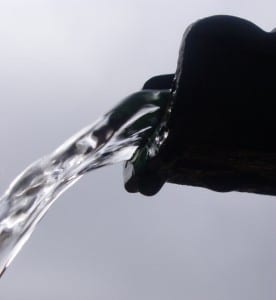The Paris Agreement lacks focus on water
By zcfad21, on 15 December 2015
 The world is celebrating the adoption of the Paris Agreement, but the role of water under a changing climate is still sidelined: Time to ride the momentum.
The world is celebrating the adoption of the Paris Agreement, but the role of water under a changing climate is still sidelined: Time to ride the momentum.
One of the biggest highlights for the water community of 2015 was the adoption of a standalone Sustainable Development Goal on water and sanitation (SDG 6) on 25th September. The celebrations were high but not long after did the water community’s hangover commence: the first draft negotiating text for the 21st United Nations Conference of Parties (COP21) was released late October, 2015 and made no explicit mention to water resources in the upcoming climate change negotiations. As COP21 got underway, several revised versions of the proposed Paris Agreement were made available throughout the two-week negotiation marathon, but all failed to make a single reference to water. Not surprisingly, the final adopted text was no different.
COP21 has now been concluded and the global community is once again celebrating what has been heralded as “[…] one of the best outcomes we could have hoped for […]”. However, the role of water seems to have been given no special consideration despite the globally recognised notion that “water is life”, which if ironic given that climate change is often considered one of the biggest threats to the future of life on this planet. In fact, the role of water within the context of climate change at the multilateral level has never really been considered a central issue for discussion, unfortunately. In 2007, The Fourth Assessment Report of the Intergovernmental Panel on Climate Change (IPCC) dedicated only half a page to the issue of water within the context of climate change, whereas some progress was made 7 years later when the 2014 Fifth Annual Assessment Report contained a separate 41-page chapter dedicated to freshwater resources and climate change.
More specifically related to the issue of adaptation to climate change, the adaptive capacity of water, especially hydrological storage components and in particular groundwater are vital, yet there is no mention of them in the Paris Agreement. San Francisco hydrologist Jason Gurdak has stressed the importance of recognising the adaptive capacity of water, stating that: “The impacts of climate change will be felt through changes in water resources, and groundwater is critical when thinking about adapting to those impacts” (Circle of Blue 1st December, 2015). When rainfall is scarce, water users tend to look towards hydrological storage components such as dams and groundwater to fulfil their needs. The IPCC (2014) predict that by 2100 under 2o C warming, precipitation in semi-arid areas could drop by 25%, making seasonal storage-based adaptive strategies increasingly vital in order to sustain global water and food demands. This is particularly significant given that the latest estimates of global groundwater volumes that are replenished over a human timescale (~50 years) is between 2-6 times that of surface freshwater volumes (Gleeson et al., 2015)
It is therefore of much concern that the adaptive role of storage to anthropogenic climate change has not been readily recognised by the global community nor widely appreciated within the water community itself. In fact, whether or not a legally binding climate change agreement had been signed in Paris, the role of storage cannot be dismissed as having the ability to meet water and food demands under uncertain hydrological regime shifts in a changing climate. The time now however is more fitting than ever for the water community to ride the momentum of the COP21 and the push for widespread promotion of the adaptive capacity of storage-focused strategies. The provisions on climate change adaptation measures in the Paris Agreement found in articles 7(1-14) have the ability to provide a good foundation to commence increased financial support for much needed studies on groundwater availability, recharge, quality and use. Earlier this month, the Paris Pact was signed by more than 250 water agencies, countries and international organisation which provide the basis for a set of recommendations for managing rivers, lakes and aquifers under a changing climate. All we can hope for now is that funding efforts made under the Paris Agreement will be targeted towards these particular types of adaptive measures.
More generally, the water community should ask itself, why it is that that the role of sub-surface stores have historically failed to be recognised and appreciated as an integral part of the hydrological cycle throughout the evolution of our field. One example can be taken from the field of International Water Law which took more than 25 years to adopt a global water convention (the United Nations Framework Convention on the Non-Navigational Uses on Water) in 1997 and a further 11 years to fully appreciate the role of sub-surface waters and their required governance through the 2008 International Law Commissions’ Draft Articles on Transboundary Aquifers. Like-wise the ways in which water scarcity have historically been assessed is based on metric approaches which fail to take into the contributions of hydrological storage components to water availability. It is now important that the water community does not get side lined in the context of climate change and push for the full integration of storage in relation to its adaptive capacity in light of the recently adopted binding Paris Agreement.
Simon Damkjaer is a PhD Researcher at the UCL Institute for Sustainable Resources
One Response to “The Paris Agreement lacks focus on water”
- 1
 Close
Close


[…] The world is celebrating the adoption of the Paris Agreement, but the role of water under a changing climate is still sidelined: Time to ride the momentum (First appeared on University College London Institute of Sustainable Resources COP21 Blog 15/12/2015) […]